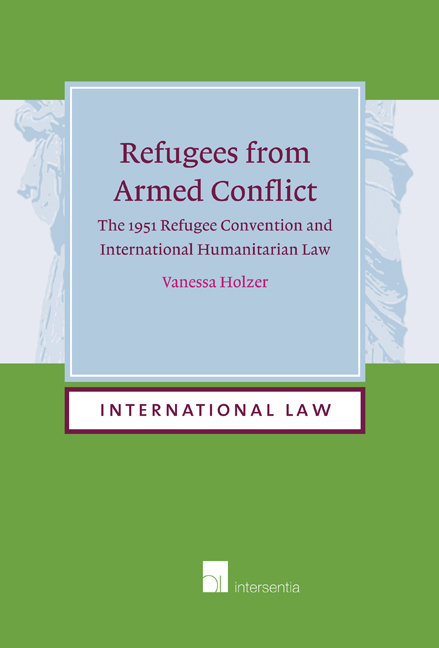Book contents
- Frontmatter
- Dedication
- Acknowledgements
- Contents
- Abbreviations
- Chapter 1 Introduction
- Chapter 2 The Historical Evolution of International Refugee Law in Light of Armed Conflict
- Chapter 3 The International Legal Framework for the Protection of the Individual in Armed Conflict
- Chapter 4 The Interpretation of the Refugee Definition
- Chapter 5 The Well-Founded Fear of Being Persecuted
- Chapter 6 Lack of Protection in the Country of Origin
- Chapter 7 The Nexus to a Refugee Convention Ground in Armed Conflict
- Chapter 8 Conclusion
- Bibliography
Chapter 7 - The Nexus to a Refugee Convention Ground in Armed Conflict
Published online by Cambridge University Press: 12 December 2017
- Frontmatter
- Dedication
- Acknowledgements
- Contents
- Abbreviations
- Chapter 1 Introduction
- Chapter 2 The Historical Evolution of International Refugee Law in Light of Armed Conflict
- Chapter 3 The International Legal Framework for the Protection of the Individual in Armed Conflict
- Chapter 4 The Interpretation of the Refugee Definition
- Chapter 5 The Well-Founded Fear of Being Persecuted
- Chapter 6 Lack of Protection in the Country of Origin
- Chapter 7 The Nexus to a Refugee Convention Ground in Armed Conflict
- Chapter 8 Conclusion
- Bibliography
Summary
INTRODUCTION
The refugee definition in Article 1A(2) Refugee Convention states that a refugee must have a well-founded fear of being persecuted for reasons of race, religion, nationality, membership of a particular social group or political opinion and that he or she must be unable or, owing to such fear, unwilling to avail him- or herself of the country of origin's protection. Armed conflicts are oft en rooted in political, ethnic or religious differences with different groups facing heightened risks of harm,867 thus suggesting the applicability of the Refugee Convention grounds. In contexts of armed conflict in which a number of people are typically at risk of harm for various reasons, the nexus requirement (or causal link) is one of the main issues that courts grapple with. This chapter explores the interpretation and application of the refugee definition's nexus requirement with respect to refugee protection claims of individuals forced to flee from their country of origin due to an armed conflict or who fear return to a country that is experiencing armed conflict.
THE NEXUS REQUIREMENT IN INTERNATIONAL REFUGEE LAW
The wording of the refugee definition's nexus requirement poses the question of precisely what kind of causal relationship and which causal standard should be used. It is also pertinent to examine whether or not the refugee claimant's predicament ought to be compared to that of others in the country of origin and what inferences can be drawn from the characteristics of an armed conflict.
THE CAUSAL RELATIONSHIP
The refugee definition states that the well-founded fear of being persecuted must be for reasons of a Refugee Convention ground. While the notion “for reasons of” denotes a causal relationship, the wording of Article 1A(2) Refugee Convention offers few clues as to the precise nature of this causal relationship. The use of passive voice (“being persecuted”) indicates that the focus is on the causal link between the refugee claimant's predicament and one or more Refugee Convention grounds, inquiring why the individual is in the predicament of fearing persecution. The Refugee Convention's object and purpose is to provide refugee protection, rather than to attribute responsibility for persecution. Therefore, the determination of the causal link must be premised on an objective assessment of the reasons underpinning the well-founded fear of persecution, not on the persecutor's subjective motivation.
- Type
- Chapter
- Information
- Refugees from Armed ConflictThe 1951 Refugee Convention and International Humanitarian Law, pp. 183 - 218Publisher: IntersentiaPrint publication year: 2015



